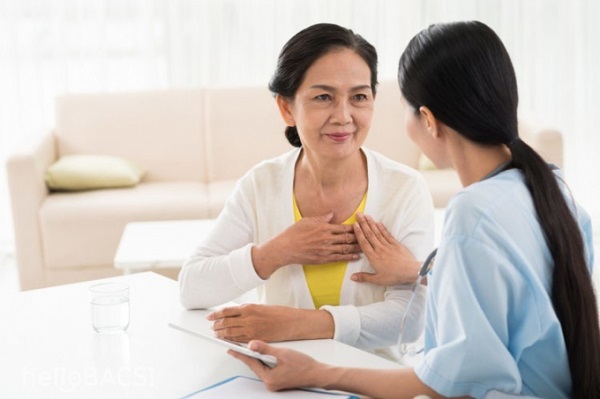Suckhoedoisong.vn - From the fact that COVID-19 plague shows that Seniors are the most vulnerable to coronavirus because their immune system is weakened, and The majority of the elderly suffer from chronic comorbidities. Dr. Nguyen Dang Khiem - Head of Emergency Department, Huu Nghi Hospital has made helpful recommendations to reduce the risk of transmission of respiratory diseases in this vulnerable population.
When the immune system "ignores" the pathogen ...
Elderly people, as defined by the World Health Organization (WHO) are people 60 years of age or older. Currently in Vietnam, the quality of life is increasing, the average life expectancy is increasing, the number of elderly people is not small.
Advanced age will, as a rule, lead to the aging of organs in the body, from the musculoskeletal system to vital organs such as the lungs, heart, and blood vessels. Aging also reduces the body's ability to adapt to changes in weather and environment, increasing the likelihood of community-borne diseases, especially respiratory diseases.

Caring for the elderly during the COVID-19 pandemic
The elderly have weak resistance, the immune system is "indifferent" to pathogens that invade the body, the body's protective barriers in the upper respiratory tract (nose, throat) are very poorly responsive, Infectious pathogens (viruses, bacteria) through the upper respiratory tract easily enter the lower respiratory tract (bronchus, lungs) and cause disease there.
Respiratory system of the elderly "poor" gradually over the years, thoracic reduced elasticity, reduced lung capacity, cough reflex, poor cough ... all these factors make the respiratory system become impaired. Weak against "enemies" are the causative agents of the respiratory tract, which are viruses, bacteria and fungi.
The emergency specialist also said that if in healthy young people, the pathogens want to get to the "deepest" respiratory organ to cause disease is the lungs, they must overcome the "protective barrier". "In the nose, throat and into the lungs they will be" surrounded "and then ejected by reflex coughing, coughing. But in the elderly, this is not entirely the case, because the respiratory organs of the elderly can no longer maintain such functions, so they are easily infected and suffer from respiratory diseases, in addition to Available background conditions (such as hypertension, diabetes, cardiovascular ...)
How to reduce the risk of respiratory infection?
According to the conclusion of a study at the National Geriatric Hospital, an elderly Vietnamese person has an average of 2.6 diseases, this figure will be 6.8 diseases in the group over 80 years old. So what do the elderly need to do to reduce the risk of transmission of respiratory illnesses?
The elderly are always the object of concern and care in Vietnam as well as in the world, with their contributions in their young years, with the rich experiences in the present life, they deserve to be society appreciates, takes care of and has certain incentives.
Firstly, the elderly need to improve their health, including proper, adequate and effective treatment of underlying conditions, such as good control of blood pressure, blood sugar, and maintenance of stable cardiovascular disease. ...
Eat enough, drink enough water: The elderly also need to eat enough food, drink enough water, sometimes a strict diet also makes the body deficient, weakening the immune system. The feeling of thirst for the elderly is almost none, so the elderly need to actively provide enough water for the body daily, at least 1.5-2l, should not drink much water in the evening before going to bed .
Restricting to go out: Elderly people should also limit going out when the weather is too harsh (too cold or too hot), when the weather changes, when a disease is circulating, especially people who can weakness, there are many underlying medical conditions or stable untreated underlying pathologies.
Currently, the COVID-19 epidemic tends to spread, the elderly should limit going out, to public places where there is a large concentration of people. If there is a health problem, if it is mild, they can take care of themselves at home under the guidance of commune and ward medical staff, if it is really necessary, they should go to medical facilities such as In case of emergency, serious illness requires follow-up and treatment.
The living environment should be well ventilated: The living environment of the elderly should be well ventilated, the air should be exchanged, often open windows but also need to avoid direct drafts.
Avoid crowded people, need to keep the general hygiene: If there is a need to go out, the elderly should avoid crowded places in narrow spaces, should use a mask, dry paper to prevent coughing, coughing, Quick antiseptic water for regular hand hygiene.
Health facilities should also consider providing drugs for chronic diseases at least once every 2 months, which will help reduce the burden on health facilities and create conditions for the elderly. have to travel a lot, especially in this time of disease.
Should you have any questions, please do not hesitate to contact us:
City International Hospital
- Address: No. 3, 17A Street, Binh Tri Dong B Ward, Binh Tan Dist. (Next to AEON Mall Binh Tan). Ho Chi Minh City.
- Operator: (+8428) 6280 3333, ext. 0
- 24/7 Emergency: (+8428) 6290 1155
- Website: https://cih.com.vn/en/
- Fan page: https://www.facebook.com/BenhVienQuocTeCity/
- Email: This email address is being protected from spambots. You need JavaScript enabled to view it.
General disclaimer
Always consult your doctor regarding any concern about your health. Your doctor will be in the best position to give the appropriate medical advice. For suspected undesirable drug reaction and seek medical attention immediately.










